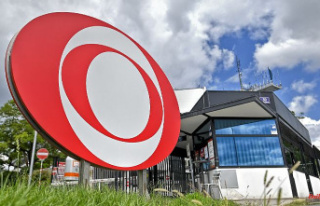They sit on roads, get stuck, cause traffic jams. Because they want to fight. Against climate change, for the preservation of our livelihoods. In the evening, a young woman is a guest of Markus Lanz on ZDF. She belongs to the group "Last Generation".
Carla Rochel seems as if she couldn't murmur a little water. She is twenty years old, studying in Heidelberg. Her family has always been "very political," she says, reporting on discussions over dinner.
Recently Carla Rochel was in prison. Not the first time. Because she belongs to the group "Last Generation". She and her comrades sit down on streets, some sticking themselves in place with simple superglue. "Because we can no longer stand this injustice of the climate catastrophe and because we are losing everything that we know and that we have become accustomed to," she explains on Wednesday evening on the ZDF talk show Markus Lanz, who occasionally plays his role as moderator leaves to criticize their actions.
Carla Rochel also has to do with Green veteran Jürgen Trittin that evening. He first occupied a site for a nuclear power plant in 1977, he says. That was the "fast breeder" in Kalkar. In the end, he played a key role in the first laws to phase out nuclear energy. That was 22 years later. Carla Rochel could take an example from him and be politically active instead of on the street. But she doesn't want that. Party work takes too long for her. Above all: the climate catastrophe must be stopped now, not in twenty years.
Her group includes people of all kinds, says Rochel: young people as well as pensioners who are worried about the future of their grandchildren. She herself was an activist with Fridays for Future. But: "You could see that their protests were simply ignored, despite a million people on the streets," she says. "The response from the government was an unconstitutional climate package. The constitution that we once agreed on is simply ignored. The Basic Law is being dragged through the dirt." When she understood that, she understood: you won't achieve anything with a few labels and demos.
At the end of January she stuck herself on a street in Berlin for the first time. "We thought about it carefully," she says. "We only go out on the street when it's safe. And of course we always form a rescue lane." The passing motorists react partly annoyed, partly with understanding to the demonstrators. Rochel tells of a mother who wanted to explain the reason for the sit-in to her little daughter and started crying in the middle.
What the demonstrators want to achieve is surprising in its simplicity: the nine-euro train ticket must come back, and a speed limit of 100 km/h on motorways. "When these things are there, we'll get off the streets," promises Rochel.
"All the effort for that?" asks Lanz. That's just the beginning, but you have to start with something, Rochel replies. "We want a sign from the federal government that it understands what the climate catastrophe means." That is why the activists have proposed a meeting with Chancellor Scholz and three ministers for Thursday. "We are open to discussion," says Rochel.
This is where Jürgen Trittin intervenes. He cannot deny a certain understanding for the demonstrators. He seems to remember his youth, sometimes even seems a bit melancholy. He says: "We have to change course very quickly, and we have to save a lot of CO2 very quickly." But this kind of extra-parliamentary protest only works if it is politically institutionalized, he explains. In fact, the first "Green Lists" were founded in the 1970s to give the anti-nuclear movement a political voice. However, Trittin has doubts when it comes to the demands of the "last generation". A speed limit on motorways would save around five million tons of CO2. In the current crisis, in his opinion, that is far too little. "What has been done in the field of renewable energies since 2001 has led to the fact that as much CO2 is saved today in power generation as the entire fleet of cars consumes," he proudly explains.
Finally, Lanz talks about an accident that happened in Berlin last week. A concrete mixer ran over and trapped a cyclist. A special vehicle from the fire brigade reached the scene of the accident late because of a demonstration by the "last generation", the woman later succumbed to her injuries. Since then, there has been talk of complicity by climate activists, which Rochel rejects. A note from the emergency doctor on duty proves her right: the vehicle would not have been used even if it had been there earlier. The fire brigade has investigated the matter and will publish its results in the next few days. Experts point out that the concrete mixer involved may have been missing an important technical device: a turning assistant that could have prevented the accident.
Finally, Lanz talks about the actions in which paintings were sprayed with mashed potatoes and tomato soup. "We also pay attention to safety there," says Rochel. The paintings are protected by panes of glass, the food can be wiped off quickly. "We are doing this because all this art will no longer be worth anything, because it will sink into the floods, because my children will no longer have a chance to look at art in the museum," she explains the actions. Presenter Markus Lanz can't convince that at all: He knows certain places in the Dolomites where the pictures can be stored temporarily, he says.
Even if the goals of the climate activists seem very sobering at the end of the show, and even if many people will still react to the activists with a lack of understanding - when Rochel says sentences like "We're not doing this for fun", then their desperation will turn clear that the "last generation" could become a "lost generation".












